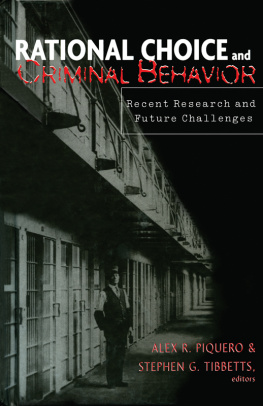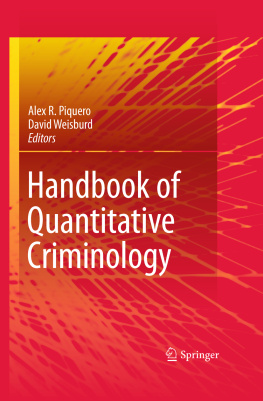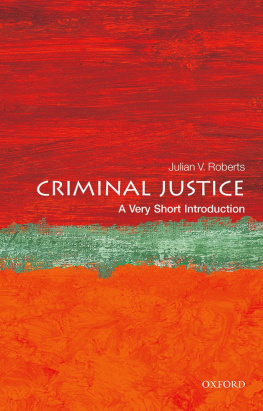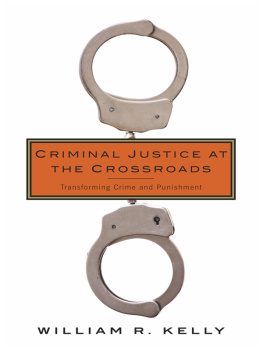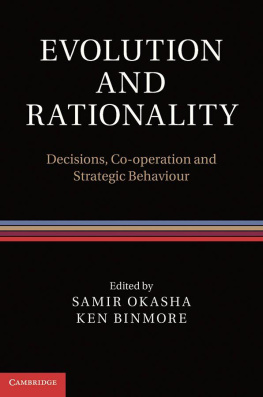RATIONAL CHOICE AND CRIMINAL BEHAVIOR
Recent Research and Future Challenges
CURRENT ISSUES IN CRIMINAL JUSTICE
RATIONAL CHOICE AND CRIMINAL BEHAVIOR
Recent Research and Future Challenges
Edited by
Alex R. Piquero
and
Stephen G. Tibbetts
First published in 2002 by
Routledge
29 West 35th Street
New York, NY 10001
This edition published 2012 by Routledge
Routledge
Taylor & Francis Group
711 Third Avenue
New York, NY 10017
Routledge
Taylor & Francis Group
2 Park Square, Milton Park
Abingdon, Oxon OX14 4RN
Routledge is an imprint of the Taylor & Francis Group
Copyright 2002 by Routledge
All rights reserved. No part of this book may be reprinted or reproduced or utilized in any form or by any electronic, mechanical, or other means, now known or hereafter invented, including photocopying and recording, or in any information storage or retrieval system, without permission in writing from the publisher.
Library of Congress Cataloging-in-Publication Data
Rational choice and criminal behavior: recent research and future challenges / Alex R. Piquero and Stephen G. Tibbetts, editors.
p. cm. (Current issues in criminal justice)
Includes bibliographical references and index.
ISBN 0-8153-3678-0
1. Criminal psychology. 2. Criminology. 3. Decision making. 4. Choice (Psychology) I. Piquero, Alexis Russell. II. Tibbetts, Stephen G. III. Current issues in criminal justice (Routledge (Firm))
HV6080.R28 2001
This book is dedicated to our parents,
Jorge and Nelly Piquero
and
Stephen and Jane Tibbetts
All that is good in us comes from them.
Contents
CHAPTER 1
Individual Propensities and Rational Decision-Making: Recent Findings and Promising Approaches
Stephen G. Tibbetts and Chris L. Gibson
CHAPTER 2
Rationality and Corporate Offending Decisions
Sally S. Simpson, Nicole Leeper Piquero, and Raymond Paternoster
CHAPTER 3
Analyzing Organized Crimes
Derek B. Cornish and Ronald V. Clarke
CHAPTER 4
Understanding Intoxicated Violence From A Rational Choice Perspective
Jean-Marc Assaad and M. Lyn Exum
CHAPTER 5
The Rational Choice Implications of Control Balance Theory
Alex R. Piquero and Matthew Hickman
CHAPTER 6
Sex Differences and Rational Choice: Traditional Tests and New Directions
Brenda Sims Blackwell and Sarah Eschholz
CHAPTER 7
Premature Affluence, Rational Choice and Delinquency: Examining the Darker Side of Affluence
John Paul Wright
CHAPTER 8
Decision Making in Violent Events Among Adolescent Males: An Examination of Sparks and Other Motivational Factors
Deanna L. Wilkinson
CHAPTER 9
Im Down for My Organization: The Rationality of Responses to Delinquency, Youth Crime, and Gangs
Scott H. Decker and G. David Curry
CHAPTER 10
Reconciling Feminism and Rational Choice Theory: Womens Agency in Street Crime
Jody Miller
CHAPTER 11
Assessing the Rationality of Criminal and Delinquent Behavior: A Focus on Actual Utility
Timothy Brezina
CHAPTER 12
The Impulsiveness and Routinization of Decision-Making
Kenneth D. Tunnell
CHAPTER 13
Dangerous Liaison? Rational Choice Theory as the Basis for Correctional Intervention
Francis T. Cullen, Travis C. Pratt, Sharon Levrant Miceli, and Melissa M. Moon
CHAPTER 14
The Impact of Lambda Skewness on Criminology: A Contingent Analysis
Thomas B. Marvell
CHAPTER 15
Deterrence, Rational Choice, and Criminal Offending: A Consideration of Legal Subjectivity
Michael Massoglia and Ross Macmillan
Acknowledgments
W e would like to thank Michael Blankenship who approached us with the idea of putting together a reader on rational choice theory. At Routledge, we would like to thank Amy Shipper, Stefanie Forster, and Tom Wang. We would like to extend a special thanks to the contributors to this volume. Operating under tight deadlines amid an already hectic schedule, they went beyond the call of duty and put together excellent essays. Without their efforts, there is no book. Finally, we would like to thank several colleagues who have helped us over the years, especially the faculty at the University of Maryland, where we spent our graduate careers, as well as the faculties of the University of Florida (Alex) and California State University, San Bernardino (Stephen). A special thank you goes to Raymond Paternoster who provided a spark within each of us to study the rational choice perspective. Throughout the years, he has been and continues to be a model scholar, teacher, and friend.
RATIONAL CHOICE AND CRIMINAL BEHAVIOR
Chapter 1
Individual Propensities and Rational Decision-Making: Recent Findings and Promising Approaches
Stephen G. Tibbetts and Chris L. Gibson
The Current Status of Rational Choice Theory
A significant portion of the studies on rational choice theory in the late 1980s and early 1990s dealt with integrating perspectives that emphasize persistent individual differences with traditional decision making models that focus on hedonistic or expected utility factors (i.e., perceived costs and benefits). However, there has been a notable decline in the late 1990s in the amount of research and theorizing on the rational choice perspective in the criminological literature. In order to ensure that rational choice perspectives are included in future investigations, it should be emphasized that such models of behavior are valid and, furthermore, tend to complement models that highlight individual propensities in the etiology of offending. Although a great deal of progress has been made toward the integration of these two types of perspectives, future studies could be improved by utilizing more valid and delineated measures, as well as developing more fully specified theoretical models. In this chapter, we review some of the successful attempts to merge these two viewpoints, and we present a number of issues that should be addressed by future investigations.
The popularity and acceptance of rational choice theory in criminological thought, which was at least partly the consequence of a resurgence of interest in the traditional theory of deterrence in the 1970s, appears to be fading. Despite a rapid rise in research and theorizing on rational choice theory that began in the mid-1980s and continued through the mid-1990s, the number of studies examining rational choice factors has decreased substantially in the past few years. This conclusion is largely based on personal observations, and more objectively on the number of entries indexed in.
Table 1. Number of Items Found In Search for Rational Choice Words Anywhere in Criminal Justice Abstracts by Year
Year(s) | Items |
19681980 | |
1981 | |
1982 | |
1983 | |
1984 | |
1985 | |
1986 | |
1987 | |
1988 | |

